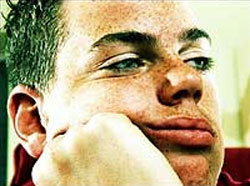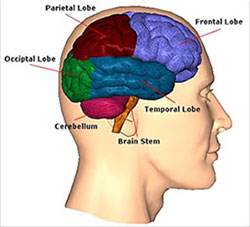Written by Naomi Moir.
Hands up who would happily go back to being 14 or 15 years old? My hand is staying firmly by my side! Although most of us would love to turn the clock back a bit, I think for the most part, we wouldn’t choose to go back to being teenagers.
Being a teenager isn’t easy – it’s a really awkward period of transition. For boys, their limbs are suddenly long and gangly, and their feet 3 sizes bigger. They can’t move without knocking into something or banging a knee or an elbow. For girls, well there’s the fact that they’re now towering head and shoulders over most the boys, not to mention the development of other aspects of their bodies! No wonder they moan and groan when we ask them to stand up and move around in class – there’s all sorts of opportunities for embarrassment!

When I first started teaching teenagers I went in with the attitude of ‘I’m a young, enthusiastic teacher, I’m going to be able to connect with these teens and they will enjoy learning and be motivated and it will all be great!’ Within my first year, I felt all that enthusiasm and energy evaporating! I spent lesson after lesson trying to figure out what it was that I needed to do to ‘reach’ them and get them interested. Sometimes things would fall into place and work, and then the very next lesson, we’d be back to the drawing board again! I blamed it on their hormones and grumbled about how difficult and frustrating they were to teach – I began to dislike them (a lot!) and to dread my lessons with them.
Then I stumbled upon an article about the development of the teenage brain (can’t remember where it was now….), which lead me to research further and eventually to this book: Why are they so Weird? Barbara Strauch, Bloomsbury. Although the book is a bit scientific at times, I did find it interesting and I did take away a few key points that have helped me with working with teenagers.
First and foremost is that it’s more than hormones affecting how teenagers behave. We are often quick to blame the issues with teens on their hormones, but a lot of research has been done in the last 10-15 years on the teenage brain. Initially it was thought that the brain stopped physically growing/changing quite early on in our development, certainly before we reached out teens. However, recent research has shown that during our teen years, the brain (the frontal lobe or cortex in particular) is undergoing significant physical changes. Just before puberty there’s a growth spurt in the brain, which is then followed by a thinning or pruning of the wiring over the teenage years. The part of the brain going through these changes is responsible for things like; decision-making, planning, the control of emotions, empathy and the understanding of other people’s facial expressions. No wonder we see some of the behaviour we do from our teens!

Although this information wasn’t a ‘quick fix’ for my lessons with teens, it did give me a greater understanding and most importantly, more tolerance. It made me think back to my teenage years and how it felt to be in that age of transition. When things didn’t go according to plan in lessons, I blamed myself and them less, and even found myself enjoying classes with them! It had an impact on practical aspects of my teaching too. For example, I included more short-term, tangible goals and built in more structure and planning to activities, ensuring they had the support they needed to make choices/decisions etc.
Food for thought
As I said, not a ‘quick fix’ – and all my classes didn’t suddenly run smoothly – but interesting ‘food for thought’ nonetheless! Is teaching teenagers something you struggle with or thrive on? What is it that helps you with working with this notoriously difficult age group? I’d love to hear ideas and tips, and your thoughts on the above.
Interesting articles
- The Independent (UK) – The teenage brain: A scientific analysis
- PBS – Inside the teenage brain
- BBC News – Rethinking the teenager


Interesting post, and liked the links at the bottom as well!
Yes, I do get a bit tired of hearing that “hormones” line as an explanation about everything that goes on with teenagers. I saw another article recently (can’t track it down now!) that suggested significant changes are going on in our brains even into early adulthood – right about the time many of us start soaking it in our first experiences with alchohol.
In language teaching in particular, I think teenagers are grossly neglected when it comes to resources and research. You tend to get children (up to about 10) and then teenagers/adults. There’s a huge gap in the middle and teens are a very special group unto themselves. I think it would be fair to say that teachers often expect too much of teens, and at other times far too little.
Nice reminder of something I’ve always pondered – thanks!
~ Jason Renshaw
A lot of what is written chimes with my early experiences of working with teenagers. Whilst it can be incredibly frustrating at times, I also found that given the chance, teenagers are the most rewarding age group to teach. A good lesson with a class of teenagers often lives long in the memory.
In my opinion, the most important quality that is required when teaching teenagers is empathy, and lots of it. Remembering that being a teenager can be an incredibly difficult time and not expecting things to go to swimmingly all them are key things to bear in mind. At the same time though, I think it is important to challenge them and have faith in them that they will respond to the challenges. A little bit of faith can go a long way in my experience and sometimes teenagers can surprise us (teachers) and themselves even, as to what they are capable of.
Thanks for the comments Jason and Peter – glad to hear this blog struck a chord.
I agree whole-heartedly about teachers (or even adults in general) often expecting far too much and then too little when they’ve failed to meet our expectations. It’s a difficult balancing act, helping and supporting their development while giving them the space to make mistakes and be themselves.
One of my most difficult, yet most rewarding, experiences was running a summer camp in the Czech Rep for 8-14yr olds. I found the teens a challange, but they would also constantly surprise me (in a good way) – as you say Peter, these feelings stick around!
Thanks to you both for your comments.
[…] and emotional changes, including changes in their brains (see Naomi Moir’s post on the OUP blog; they would normally prefer to be somewhere else on a sunny afternoon; if they do want to come to […]
I work for the Youth offending service and therefore work with some very trying teens. The art group I run twice weekly for children struggling with or unable to attend school has proven to be very popular with the youngsters. I agree that empathy in abundance is essential, so is the ability to pick one’s battles wisely. Children need the opportunity to express themselves in an arena they feel safe in. They need to be encouraged to ask questions and never ridiculed for asking what some might consider to be a silly question. All too often I have heard teaching staff complain that a child is “challenging” and when you delve further into the complaint the teacher will mention that a child is constantly asking questions. Whilst I understand as a mother and youth worker that this can be very trying, I can’t help but think that as adults, it is our responsibility to help these adults in training to make sense of this crazy world!
I have often told the parents of the teens I work with about the changes taking place both physically and mentally and how draining they are. Most parents are just hugely relieved to hear that the behaviour of their teen is not entirely due to their own failings.
Am looking to do some freelance work with families with difficult teens in the Oxfordshire area. Any ideas?
Lucy